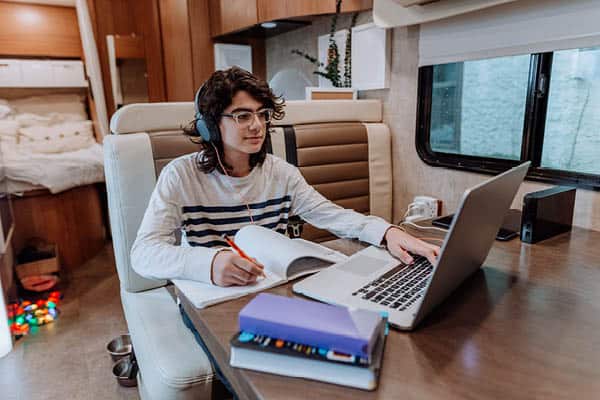A growing number of families don’t let having school-age children get in the way of seeing the U.S. — or even the world, according to The 74. These “roadschoolers” say their well-traveled kids are getting far more knowledge and real-life experience than they ever could from a book, a computer or even a typical classroom teacher.
These mobile families include a mix of traditional homeschoolers and newcomers who pulled up stakes during COVID. One consequence: the RV industry is working to rebuild sales to pre-pandemic levels as the Covid-driven sales boom cools.
With a combined 18 years as “fulltimers” — as those who live out of their vehicles call themselves — “Republic of Nomads” founders Christian Axness and Stephanie Simpson negotiate reduced homeschooling rates for participants at national parks and museums. Some of their events are free, while a weeklong camping adventure under the stars might run around $300. In 2022, they rented an observatory in Joshua Tree where students talked to local astronomers. In January, they took off for Baja, California, to pack in Spanish lessons, oceanography and windsurfing.
“These are not just surface-level experiences,” Axness said, “but immersive events because of the nature of our lifestyles.”
For many families, monthly living expenses are about the same as if they lived at home, said Tiffany Johnsrud, a mom of three from Dubuque, Iowa.
“We’re not spending money on soccer and softball,” she said. “We’re spending it on experiences.”
The RV Industry Association started to pay more attention to roadschoolers in the fall of 2020, when more than half of the nation’s schools offered only remote learning. Its biannual survey showed that 45% of RVers were also educating children.
Drawing on this growing segment of the RV population, Fulltime Families, a membership organization, has a Facebook page for roadschoolers.
“There are people who are making more of this lifestyle change,” said Monika Geraci, spokeswoman for the association. “It’s not just a pandemic thing.”
Most roadschoolers say they periodically check in to see whether their children still prefer the itinerant lifestyle. Some make it obvious they’re ready for a change.
After trekking through the nation’s wide-open spaces for the past seven years, 11-year-old Eloise Ridley longed for the four walls of a traditional classroom. Her father, Kevin, persuaded her to spend another year traveling by offering a winter at Disney World. But last year, they permanently parked their RV and enrolled Eloise and her 7-year-old sister Eliza at Pagosa Elementary in southwest Colorado.
Others who left the road behind said it took just a few months before RV living — and the friendships they had formed — called them back.
Many “Republic of Nomad” families travel together, creating a community of friends that’s not unlike what their children would enjoy in a normal neighborhood. An Iowa ninth-grader, for instance, earns money babysitting and tutoring younger children from another family.
She’s still in touch with friends back home, but isn’t longing to return. Unless you count the one-room schoolhouse from 1909 at the Coachella museum, she and her siblings haven’t been in a traditional classroom since 2020. She even has plans to “move out” into her own van at 18 and keep traveling. She marveled at how much of the country she’s seen in four years.
The 74





